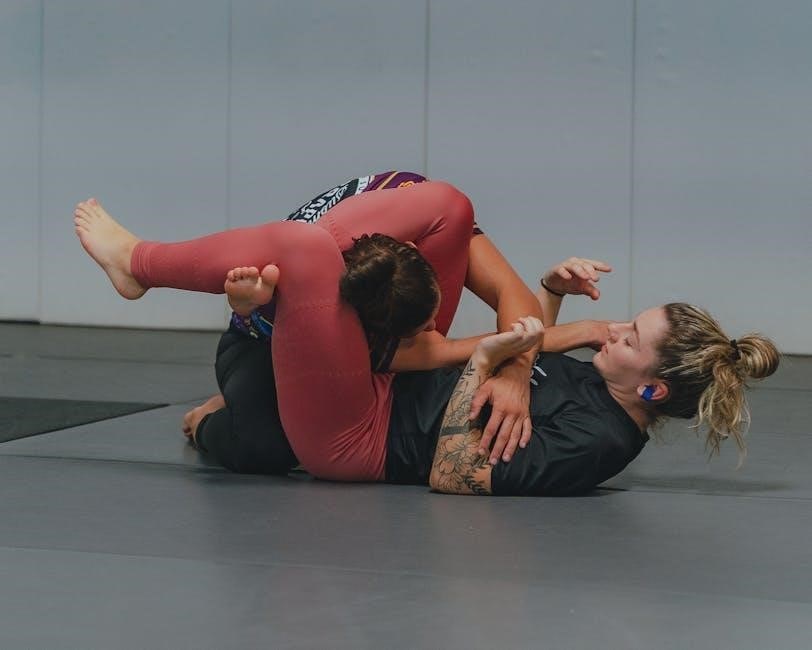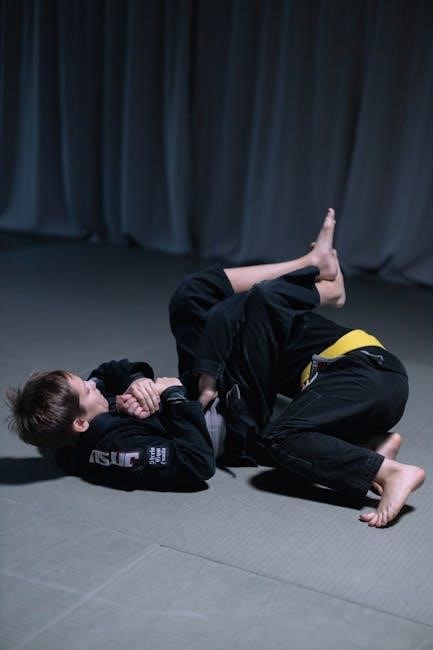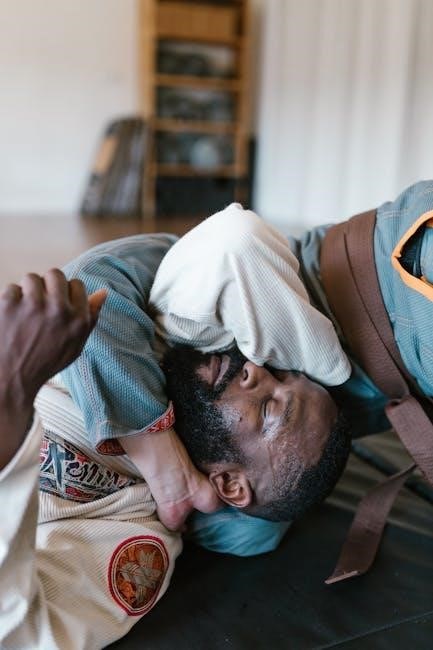
BJJ strength training programs are designed to enhance performance through structured routines focusing on strength‚ power‚ and conditioning. These programs are tailored to individual goals and experience levels‚ ensuring optimal results for practitioners of all levels.
Overview of BJJ Strength and Conditioning
BJJ strength and conditioning programs are structured to enhance athletes’ performance by focusing on foundational movements‚ explosive power‚ and injury prevention. These programs are tailored to complement BJJ training‚ ensuring practitioners build strength without compromising technique. They typically include phases such as foundational strength‚ power development‚ and competition preparation‚ with exercises like power cleans‚ squats‚ and pull-ups. The programs are designed for both beginners and advanced practitioners‚ with training frequencies varying from 1 to 3 times per week‚ depending on BJJ class schedules. The goal is to improve longevity‚ injury resistance‚ and overall performance on the mat. By integrating strength training with recovery strategies‚ BJJ athletes can achieve a balanced approach to their martial arts journey.
Importance of Strength Training for BJJ Performance
Importance of Strength Training for BJJ Performance
Strength training is crucial for BJJ performance as it enhances power‚ endurance‚ and overall athleticism. It allows practitioners to execute techniques more effectively and maintain energy levels during prolonged rolls. Stronger athletes can better withstand the physical demands of BJJ‚ reducing injury risk and improving recovery. Additionally‚ strength training complements technical skills‚ making transitions and submissions more efficient. Incorporating a well-structured program can elevate a practitioner’s game‚ ensuring long-term success in competitions and training;

Key Components of a BJJ Strength Training Program
A well-rounded program includes fundamental movements‚ periodization‚ and recovery strategies‚ ensuring strength gains complement BJJ techniques without compromising flexibility or technique proficiency.
Workout Structure and Frequency
A structured BJJ strength program typically includes upper body‚ lower body‚ and full-body workouts. Exercises like power cleans‚ squats‚ bench press‚ and pull-ups are common‚ with sets and reps progressing weekly. Training frequency varies based on BJJ class attendance: 2x per week for active competitors‚ 2-3x for lighter schedules‚ and 1x for maintenance during peak competition weeks. This balance ensures strength gains without overtraining‚ allowing for optimal recovery and performance.
Essential Exercises for BJJ Strength
Key exercises for BJJ strength include power cleans‚ squats‚ bench press‚ pull-ups‚ and deadlifts. These movements build foundational strength‚ power‚ and endurance. Power cleans improve explosive force‚ crucial for takedowns and transitions. Squats and deadlifts strengthen the legs and core‚ enhancing stability and control. Bench press and pull-ups target upper body strength‚ vital for grips and submissions. Accessory exercises like rows‚ lunges‚ and planks are also essential for muscle balance and injury prevention. Functional movements‚ such as kettlebell swings and medicine ball throws‚ mimic BJJ-specific actions‚ boosting sport performance. A well-rounded program ensures full-body development‚ addressing the physical demands of Brazilian Jiu-Jitsu. Proper form and progression are emphasized to maximize results and reduce injury risk‚ ensuring athletes can perform at their best on the mat.

Sample 4-Week BJJ Strength Training Program
A structured 4-week program with upper‚ lower‚ and full-body days. Includes power cleans‚ squats‚ and pull-ups‚ progressing in intensity weekly. Balances strength and technique for optimal BJJ performance.

Exercise Selection and Progression
Exercise selection focuses on compound movements like squats‚ deadlifts‚ and bench presses‚ which build functional strength and power. Progression involves increasing weight‚ volume‚ or intensity weekly. For example‚ power cleans start with lower weights to master form‚ then gradually increase loads. Pull-ups and rows target upper body strength‚ essential for gripping and control. Lower body exercises‚ such as lunges and leg presses‚ improve stability and explosiveness for takedowns. Each exercise is tailored to the practitioner’s level‚ ensuring steady improvement without injury. Advanced lifters incorporate plyometrics and explosive movements to enhance dynamic power. Periodization is key‚ with phases of building strength followed by deload weeks to allow recovery. This structured approach ensures continuous progress and peak performance for competitions or training camps.
Training Frequency and Recovery Strategies
Training frequency varies based on BJJ class attendance and competition goals. For active competitors‚ 2x per week is ideal‚ ensuring strength gains without hindering recovery. Lighter BJJ schedules (2-3x per week) allow for 2-3 strength sessions‚ while maintenance mode (1x per week) prevents overload. Recovery strategies include deload weeks every 4-6 weeks‚ featuring reduced intensity and volume. Techniques like foam rolling‚ stretching‚ and ice baths aid muscle recovery. Sufficient sleep (7-9 hours) and balanced nutrition are crucial for muscle repair and growth. Periodization ensures peak performance during critical training phases‚ balancing strength and technique development. Consistent recovery practices prevent injuries and enhance overall progress in BJJ strength programs.

Nutrition and Recovery for BJJ Athletes
Nutrition is crucial for fueling performance and recovery. A balanced diet with protein‚ carbs‚ and healthy fats supports muscle repair. Proper hydration and sleep enhance recovery‚ optimizing BJJ training.
Meal Planning for Optimal Performance
Meal planning is essential for BJJ athletes to ensure consistent energy levels and recovery. A balanced diet rich in lean proteins‚ complex carbohydrates‚ and healthy fats supports muscle repair and growth. Athletes should aim to consume meals high in protein like chicken‚ fish‚ and eggs‚ along with whole grains and vegetables‚ to fuel their training. Hydration is also critical‚ with water and electrolyte-rich beverages aiding in performance and recovery. Additionally‚ timing meals around training sessions can optimize energy availability and recovery. A well-structured meal plan tailored to individual caloric needs helps maintain strength‚ endurance‚ and overall performance on the mat. Proper nutrition is a cornerstone of any successful BJJ strength training program.
Recovery Techniques to Enhance Training
Recovery is a critical component of any BJJ strength training program‚ as it allows the body to repair and adapt. Techniques such as foam rolling‚ stretching‚ and ice baths help reduce muscle soreness and improve flexibility. Dynamic and static stretching can enhance mobility‚ while ice baths reduce inflammation. Additionally‚ ensuring adequate sleep (7-9 hours) is vital for muscle repair and hormonal balance. Active recovery methods‚ such as light cardio or yoga‚ can also promote blood flow and maintain mobility. Proper recovery strategies not only prevent injuries but also enable athletes to train more consistently and at a higher intensity. Incorporating these techniques into a routine ensures optimal performance and long-term success in BJJ training.
A well-structured BJJ strength program balances strength‚ conditioning‚ and technique‚ ensuring consistent progress and injury resistance for long-term success in Brazilian Jiu-Jitsu training.
Final Tips for Implementing a BJJ Strength Program
When implementing a BJJ strength program‚ start with foundational movements and progress gradually. Focus on proper form to prevent injuries and maximize results. Ensure recovery strategies‚ such as rest and nutrition‚ are prioritized. Periodize your training to avoid plateaus‚ alternating between strength-building and technique-focused phases. Set specific‚ measurable goals to track progress and stay motivated. Incorporate conditioning exercises to improve endurance‚ as BJJ requires both strength and stamina. Balance strength training with regular BJJ drills to maintain technique proficiency. Lastly‚ seek guidance from experienced coaches or proven programs to tailor your routine effectively. Consistency and patience are key to achieving long-term success in Brazilian Jiu-Jitsu.